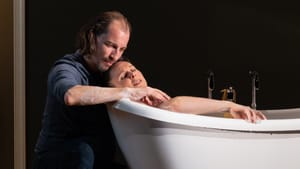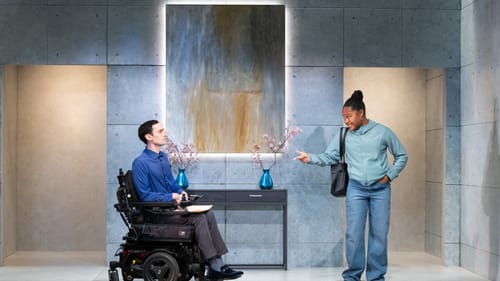Stay in the Loop
BSR publishes on a weekly schedule, with an email newsletter every Wednesday and Thursday morning. There’s no paywall, and subscribing is always free.
Necessary intimacies
Philadelphia Theatre Company presents Martyna Majok’s Cost of Living

In his curtain speech on opening night of Martyna Majok’s Cost of Living, which follows two pairs of people navigating disability and caregiving, Philadelphia Theatre Company co-artistic director Tyler Dobrowsky lauded accessibility consultant Katie Samson as “a galvanizing force for good in Philadelphia and in the world.”
It’s great to see someone like Samson, the director of education at Art-Reach (the show’s community partner), who has also written for BSR and is a valued colleague, get the acknowledgment she deserves. Her professional experience in accessibility and inclusion training, plus her lived experience as a quadriplegic who is hard of hearing, were no doubt vital to this production’s portrayal of John (Christian Prentice), who has cerebral palsy, and Ani (Rachel Handler), who is a quadriplegic amputee.
John is a wheelchair user doing his PhD in political science at Princeton. We meet him as he interviews recent Princeton grad Jess (Cianna Castro) for a caregiving position that includes helping him shave, shower, and dress. John is white and conspicuously wealthy; Jess is Black, the child of immigrants, and despite her educational pedigree, struggles to survive on a series of bartending gigs. Meanwhile, Eddie (Ross Beschler), a recovering alcoholic, pursues an uneasy détente with Ani, his estranged ex-wife, when he offers to join her care team after she has a disabling accident.
Disability representation onstage
Majok’s Pulitzer-winning script specifies that John and Ani should be played by disabled actors. Handler lost her leg below the knee after a car crash in 2012; according to the production team, Prentice has a non-apparent disability. There are many working and aspiring actors who use wheelchairs and have different physical capabilities and needs, but roles for them are few and far between, especially when non-disabled actors are tapped to play the occasional disabled character who makes it to stage and screen. I would love to see this play starring an actor with cerebral palsy or who uses a wheelchair in real life.
Independence and reliance
Prentice brings a compelling mix of superciliousness and vulnerability, tempering John’s acerbic front with beatific smiles as John and Jess enter a maze of necessary intimacies complicated by gender, race, money, and class. Castro’s warm, practical clarity makes a later emotional twist land with devastating effect. Beschler captures Eddie’s wounded, self-deprecating brashness and the tenderness lurking just below. And Handler gives a forceful yet nuanced performance, especially since only her head is visible in a crucial scene. She and Beschler nail their North Jersey dialect.
Dynamic direction from Jeffrey Page (aided, I imagine, by Samson) underlines the important truth that, contrary to phrases like “wheelchair-bound,” people aren’t “confined” to wheelchairs but liberated by them. Bathroom scenes are marvels of stagecraft as well as believable physicality, a tender balance of independence and reliance that goes beyond the body.
Distracting design
In his director’s note, Page says that his vision for the production was “scenes as a series of vignettes, like a doll’s house of the imagination,” and set designer Christopher Ash provides an impressive but overpowering concept: the show’s two main settings (John and Ani’s homes) are built into giant boxes that roll back and forth across the stage each time the scene changes, with a monumental rumble from sound designer Jordan McCree. To me, it’s a distancing effect that dwarfs the excellent actors and saps the show’s energy between scenes.

These settings are also surprisingly bare and anonymous (John’s home looks like a tiled bunker with sprays of fake flowers; Ani’s living space has empty walls and almost no personalizing detail). It’s hard to know whether this reflects a focus on the set’s ambitious mechanical qualities over its aesthetic ones or if this startling emptiness signifies a sense of dislocation or lack of agency for the characters. Lights by Natalie Robin also undermine the intimacy and realism of the performance, with hot, surreal neon washes, stark wall shadows, and a dizzying, distracting strobe effect in the final scene thanks to a ceiling fan that whirs inexplicably above the wintry setting.
Sex and disability
Majok’s script is full of verbal gems about marriage, education, and recovery (both mental and physical), like a sardonic Ani sharing her physical therapy homework: “Try to move.” Though when John brings up the subject of sex and disability (“I used to consider hookers”), it’s a disappointing throwaway, played here for laughs. Majok could have uplifted this aspect of sex work—a conversation that would’ve fit right into her examination of the many emotional, physical, and economic realities of caregiving. Anyone who wants a more illuminating treatment of sex and disability should tune into Andrew Gurza’s podcast, Disability After Dark, particularly an episode in which he interviews his own longtime sex worker about their relationship.
Rolling in the right direction
PTC offers some resources alongside this production, including a playbill insert with QR codes for learning about the language and etiquette
of disability. In an ideal world, representation of disabled artists and conversations about disability, as well as captioning, ASL interpretation, relaxed performances, audio description, wheelchair access (including bathrooms), plus Covid-conscious policies, would come standard with every production. With most companies offering options like captioning or mask requirements for only one or two performances of the run, we’re a long way off from true inclusion but shows like Cost of Living are a step (or a roll) in the right direction.
What, When, Where
Cost of Living. By Martyna Majok, directed by Jeffrey Page. $20-$78. Through February 18, 2024, at the Suzanne Roberts Theatre, 480 S Broad Street. (215) 985-0420 or philadelphiatheatrecompany.org.
Accessibility
PTC is a wheelchair-accessible venue. There was an audio-described performance of Cost of Living on Saturday, February 10. There will be an ASL-interpreted performance at 7pm on Thursday, February 15, and an open-caption performance at 2pm on Saturday, February 17.
Sign up for our newsletter
All of the week's new articles, all in one place. Sign up for the free weekly BSR newsletters, and don't miss a conversation.

 Alaina Johns
Alaina Johns